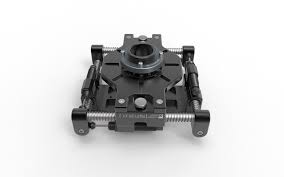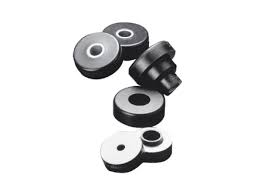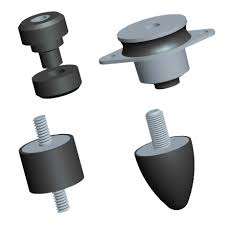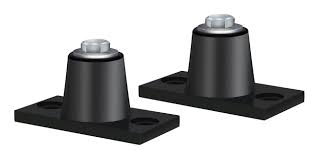Isolators vibration technology has revolutionized the way we approach noise reduction and maintenance in various industries. This innovative...
Isolators vibration technology has revolutionized the way we approach noise reduction and maintenance in various industries. This innovative technology aims to minimize the impact of vibrations, resulting in reduced noise levels and lower maintenance requirements. By effectively isolating vibrations, equipment and machinery can operate more smoothly and efficiently, ultimately leading to improved performance and longevity. In this article, we will delve into the benefits and applications of isolators vibration technology, and explore how it is shaping the future of noise reduction and maintenance in diverse sectors.
Isolators vibration technology is designed to reduce noise and maintenance by isolating the equipment from the surrounding environment. This technology utilizes isolators to absorb and dampen vibration, resulting in quieter operation and reduced wear and tear on the equipment. This can lead to cost savings and improved efficiency for various industrial and commercial applications.
Isolators Vibration technology is a method used to minimize noise and lower maintenance requirements by isolating equipment from its surroundings. This is achieved through the use of isolators that absorb and dampen vibrations, resulting in quieter operation and decreased wear and tear on the equipment. Implementing this technology can lead to cost savings and greater efficiency, making it beneficial for a wide range of industrial and commercial applications.
Understanding the Importance of Isolators Vibration in Industrial Applications

Isolators are crucial in industrial applications for managing and controlling vibration. Vibration can negatively impact equipment, structures, and the surrounding environment, leading to safety hazards and reduced efficiency. Isolators help mitigate these effects by isolating the source of vibration and preventing its transmission to other components. They also protect delicate instruments and machinery, improve overall performance, and reduce maintenance costs. Understanding the importance of isolators in industrial settings is essential for ensuring the smooth and safe operation of equipment and facilities.
The Key Role of Isolators Vibration in Reducing Machinery Wear and Tear

Isolators vibration plays a key role in reducing machinery wear and tear by absorbing and dissipating the energy generated by the machine's movements. This helps to prevent excess vibration from being transmitted to the surrounding equipment and structures, which can lead to premature wear and damage. By effectively isolating vibration, machinery components are able to operate more smoothly and efficiently, extending their lifespan and reducing maintenance requirements. Properly designed and implemented isolators can also minimize noise and improve overall workplace safety.
Choosing the Right Isolators Vibration for Your Specific Equipment Needs

Choosing the right isolators for your specific equipment needs involves considering the weight and size of the equipment, the frequency and magnitude of the vibrations, as well as the environmental conditions where the equipment will be operating. It is important to select isolators that are designed to effectively reduce the transmission of vibrations and minimize any potential damage to the equipment. Additionally, factors such as installation requirements, maintenance considerations, and overall cost should be taken into account when making a decision. Consulting with a professional or supplier specializing in isolators can help ensure that the right product is chosen for your specific equipment needs.
Implementing Isolators Vibration for Improved Workplace Safety and Comfort

Implementing isolators vibration for improved workplace safety and comfort involves the use of vibration isolators to reduce the transmission of vibration from machinery and equipment to the surrounding environment. This can help to minimize the risk of injury and discomfort for workers, as well as protect sensitive equipment from damage. Isolators can be applied to various types of machinery, including HVAC systems, industrial machinery, and transportation vehicles. By implementing isolators vibration, workplaces can create a more comfortable and safe environment for their employees, ultimately improving productivity and well-being.
Maximizing Efficiency with Properly Installed Isolators Vibration Systems
Maximizing efficiency with properly installed isolators vibration systems is crucial for reducing the impact of vibration on machinery and structures. By effectively isolating equipment from the surrounding environment, these systems can minimize wear and tear, reduce downtime, and increase the overall lifespan of assets. Proper installation of isolators involves careful consideration of factors such as load capacity, natural frequency, and environmental conditions. By ensuring that isolators are correctly sized and positioned, it is possible to achieve optimal vibration isolation and improve the performance of industrial equipment. In addition to promoting equipment longevity, well-installed vibration isolation systems can also contribute to a safer and more comfortable working environment for personnel. By limiting the transmission of vibration and noise, these systems can help to mitigate the risk of occupational hazards and enhance overall workplace satisfaction. Overall, maximizing efficiency with properly installed isolators vibration systems is an essential aspect of maintaining the reliability, safety, and performance of industrial machinery and structures. Investing in high-quality isolators and ensuring their proper installation can yield substantial long-term benefits for businesses across various industries.
Exploring the Various Types of Isolators Vibration Available on the Market
Isolators are essential in minimizing the effects of vibration in various industrial and mechanical applications. Some of the most common types of isolators include elastomeric mounts, spring isolators, air mounts, and inertia bases. Each type offers different levels of vibration isolation and may be suitable for different types of machinery or equipment. It's important to consider factors such as load capacity, frequency range, and environmental conditions when selecting the appropriate isolator for a specific application. Additionally, some isolators may also offer features such as leveling capabilities and adjustable stiffness to further enhance their effectiveness. Understanding the various types of isolators available on the market can help in choosing the most suitable solution for effectively managing vibration in equipment and machinery.
Common Mistakes to Avoid When Installing Isolators Vibration in Your Facility
When installing isolators for vibration in your facility, it's important to avoid some common mistakes in order to ensure their effectiveness. One common mistake is not carefully considering the specific requirements and conditions of the equipment and environment where the isolators will be installed. It's important to thoroughly understand the vibration levels, weight and size of the equipment, and other relevant factors in order to select the right isolators for the job. Another mistake to avoid is improper installation, including issues such as not properly leveling the equipment, not securely mounting the isolators, or not following manufacturer guidelines. Additionally, failing to regularly inspect and maintain isolators can lead to decreased effectiveness over time. It's important to regularly check for wear and tear, ensure proper alignment, and address any issues promptly. By avoiding these common mistakes, you can help ensure that isolators for vibration effectively protect your equipment and facility.
The Future of Isolators Vibration Technology: Innovations and Advancements
The future of isolators vibration technology is primed for continued innovations and advancements as the demand for more effective and efficient vibration control solutions grows. With the increasing focus on reducing vibrations in various industrial, commercial, and residential applications, there is a need for isolator technology to evolve to meet these changing requirements. One area of potential advancement is the development of smarter isolators that incorporate sensors and monitoring capabilities to provide real-time feedback and adjustments. This could lead to more precise and targeted vibration control, resulting in improved equipment performance and reduced maintenance needs. Additionally, advancements in materials science and manufacturing techniques are expected to lead to the development of more durable and versatile isolator products. This could include the use of advanced polymers, composites, and other innovative materials to create isolators that are better suited for a wider range of applications and operating conditions. Furthermore, the integration of predictive analytics and machine learning into isolator technology may allow for more proactive and preventative maintenance, ultimately extending the lifespan of equipment and reducing downtime. Overall, the future of isolators vibration technology is promising, with ongoing advancements expected to bring about more effective, efficient, and intelligent solutions for controlling and managing vibrations in various industries.
In conclusion, the new technology of isolators vibration offers significant advantages in reducing noise and maintenance for various industrial and commercial applications. By effectively minimizing vibrations, these isolators ensure smoother operation and longer lifespan for equipment, ultimately leading to improved overall performance and cost savings. With its potential to revolutionize the way we approach noise control and maintenance, isolators vibration stands as a promising solution for a wide range of industries.
See also
https://www.dunavins.com/vibration-isolators https://www.karman-rubber.com/vibration-isolators.html